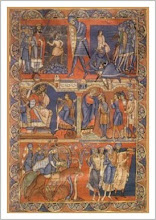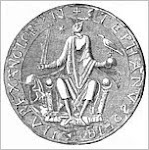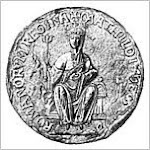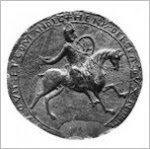• The Heptarchy - The Seven Kingdoms of Anglo-Saxon England
Wessex: Ancient kingdom of the West Saxons
From the sixth century Wessex was the kingdom of the West Saxons. At the beginning of the ninth century the king of Wessex, Egbert, subdued the Celts of Devon and Cornwall, defeated the Mercians in battle, and became Bretwalda, the high king of Britain. He had come to the throne in 802AD and decisively defeated King Beornwulf of Mercia at Ellendun in 825AD, seizing control of Sussex, Kent and Essex from the Mercians. He conquered Mercia in 829AD, forcing King Wiglaf into exile and he secured acknowledgment of his overlordship from the king of Northumbria. Wiglaf returned and restored Mercian independence in 830AD, but the expansion of Wessex across south eastern England became permanent.
Long settled as mostly farmers in the lands that their ancestors had invaded four centuries before, the Saxons were now called upon to repel another wave of invaders - the Vikings of Norway and Denmark. The raids had begun in the eighth century but by the middle of the ninth had become an invasion.
Danish Viking raids on Wessex occurred frequently from 835AD onwards and in 851AD a huge Danish army arrived in the Thames estuary. However they were decisively crushed by Egbert's son and successor King Aethelwulf in the Battle of Aclea, which postponed Danish conquests in England for a few years although raids on Wessex did continue. In 865AD another huge Danish army arrived in England, and in the following years the Danes over ran eastern England and Northumbria, and began to threaten the southwest.
In 871AD the Danes invaded Wessex, but were checked at Ashdown in the Berkshire Hills by Aethelred and Alfred of Wessex. The arrival of yet another Danish army compelled Alfred to pay the Danes to leave Wessex, but in 876AD they returned before finally withdrawing in 877AD. At the beginning of 878AD the Danes started a winter invasion of Wessex and took Alfred by surprise. They over ran much of the kingdom and Alfred took refuge with a small band of followers in the marshes of Somerset, but some months later he was able to gather an army and defeat the Danes at the Battle of Edington which brought about their final withdrawal from Wessex. Forced to come to terms, they would retire behind the line of Watling Street, into the Danelaw, and also accept Christianity.
This left Alfred as ruler of the south and west. From his capital in Winchester, he created an efficient army and built a fleet, organising his defences so that later Danish raiders were diverted to northern France. King Alfred the Great then turned his attention to reforming the administration of justice, rebuilding churches, founding schools for the sons of his noblemen which included bringing over foreign scholars, and began the compilation of the English Chronicle. With assistance from his scholars, he himself translated several books from Latin into English including Bede's Ecclesiastical History, and to his version of Gregory's Cura Pastoralis he added a preface describing the decay of learning. When Alfred died in 900AD the later part of the tenth century had become something of a golden age due in a large part to his work. The West Saxon dialect of this period became the standard written form of Old English for the rest of the Anglo-Saxon period and beyond.
Aethelflaed, the daughter of Alfred the Great, married Aethelred Ealdorman of Mercia and after his death in 911AD she ruled as ‘Lady of the Mercians’ until her death in 918AD. Meanwhile Alfred's son, Edward the Elder, was in possession of London, Oxford and their surrounding lands, which had been annexed from Mercia to Wessex. Between the years 913AD to 918AD Edward overwhelmed the Danes of Mercia and East Anglia, and brought all of England south of the Humber under his power. After Aethelflaed died Edward took over direct control of Mercia. By c.954 King Edred had conquered Northumbria, bringing the whole of England under one ruler. After the death of King Edred in 955AD, England was divided once more, with Edwig ruling in Wessex while Mercia passed to Edgar. However, when Edwig died in 959AD the whole of England came under Edgar's control. This unity was threatened once more when Ethelred II (The Unready) became king in 975/8AD. The kingdom fell into confusion and in 980AD the Danish renewed their attacks.
When Danish king Cnut came to power in 1016, he established earldoms based on the former kingdoms of Northumbria, Mercia and East Anglia, and a few years later created an earldom of Wessex, which encompassed all of England south of the Thames and was governed by Earl Godwin. Godwin and then his son Harold became the most powerful men in English politics after the king. After the death of Edward the Confessor in 1066, Harold was elected king by the Witan which reunited the earldom of Wessex with the crown. Harold would be the last Anglo-Saxon King of England.
Footnote:
English administration (The Witan): the king was dependent upon the loyalty of his thegns, local landowners, and the bishops and ealdormen who composed his Witan.
• More about Wessex:
• Discover The Kingdom of Wessex
• Read about King Alfred the Great
• Explore Westminster Abbey
Subscribe to:
Post Comments (Atom)








No comments:
Post a Comment